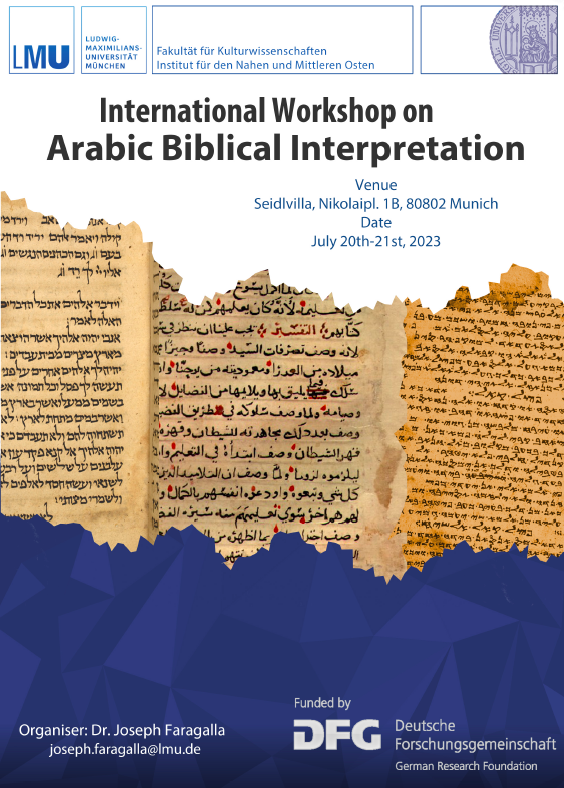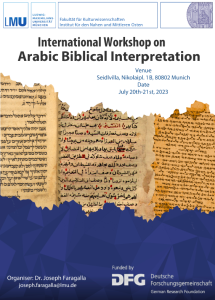
- This event has passed.


Biblical interpretation holds immense significance as it serves as a vital tool for understanding and interpreting the sacred texts of the Bible. The process of biblical interpretation involves a systematic and critical examination of the Scriptures to unearth their intended meaning, historical context, and cultural nuances. The workshop on Arabic Biblical Interpretation aims to illuminate the rich tapestry of interpretations found within Christian Arabic, Judeo-Arabic, and Samaritan Arabic traditions. By bringing together scholars and researchers from diverse backgrounds, this Workshop will foster interdisciplinary dialogue and contribute to a deeper appreciation and understanding of the Arabic-speaking world’s unique contributions to biblical scholarship.
Thursday, July 20th 2023
09:00 – 09:10
Welcome
Joseph Faragalla (Ludwig-Maximilians-Universität München)
Christian-Arabic Bible Interpretation
Session 1: Text and Manuscripts
09:10 – 09:40
BL, Arundel Or. 15 – A very modern mediaeval Bible project
Miriam Hjälm (University College Stockholm)
09:40 – 10:10
The skin of text: Explanatory translation strategies in the ‘arcaic section’ of the Gospels (Cod. Vat. Ar. 13)
Juan Pedro Monferrer-Sala (University of Cordoba)
10:10 – 10:40
Coffee Break
Session 2: Commentators
10:40 – 11:10
Sāwīrus b. al-Muqaffaʿ: Exegesis of the Bible in his canons and theological works
Rocio Daga Portillo (Ludwig-Maximilians-Universität München)
11:10 – 11:40
Seeking the Star: Unveiling the Magi Narrative in the Gospel of Matthew through Ibn Kalīl’s Commentary
Joseph Faragalla (Ludwig-Maximilians-Universität München)
11:40 – 12:10
Divine Adoption in Jewish, Christian, and Muslim Scriptures: Al-Jāḥiẓ’s View
Nathan Gibson (Goethe-Universität Frankfurt am Main)
12:10 – 14:00
Lunch break
14:00 – 14:30
Ibn al-Ṭayyib Exegetical Works on Psalms: Sources, Classification, and Genres
Zakka Labib (Ludwig-Maximilians-Universität München)
14:00 – 15:00
Hidden Commentaries: The Introduction of al-Muʼtaman ibn al-ʻAssāl to the Arabic translations of the Pauline Epistles
Vevian Zaki (Hill Museum & Manuscript Library / Ludwig-Maximilians-Universität München)
15:00 – 15:30
Coffee Break
Session 3: Biblical Books
15:30 – 16:00
Reciting and Writing: Ritualization and Biblical Interpretation in the Christian Arabic Guide to the Psalms
Stephen Davis (Yale University)
16:00 – 16:30
Translation Techniques of Christian Arabic Versions of Isaiah. An Analysis of the Servant Songs’ Pluses and Minuses
Peter Gadalla (Pontifical Biblical Institute)
16:30 – 17:00
The Bible in Early Christian Arabic Monastic Multiple-Text-Manuscripts: The Example of the Book of Job
Peter Tarras (Ludwig-Maximilians-Universität München)
Friday, July 21st 2023
Judeo-Arabic Bible Interpretation
Session 1: Commentators
09:00 – 09:30
Yaʿqūb al-Qirqisānī’s Commentary on the Book of Genesis (Kitāb al-Riyāḍ wa-l-Ḥadāʾiq)
Miriam Goldstein (Hebrew University of Jerusalem)
09:30 – 10:00
Narrative expansion in Qaraite exegesis – some examples from Sahl ben Maṣliaḥ’s (10th c. CE) commentary on Genesis
Friederike S. Schmidt (Ludwig-Maximilians-Universität München)
10:00 – 10:30
The intellectual historical setting of Yeshuʿah ben Yehudah’s (11th c.) scriptural hermeneutics
Gregor Schwarb (Ludwig-Maximilians-Universität München)
10:30 – 11:00
Coffee Break
Session 2: Commentary and Language
11:00 – 11:30
Judaeo-Arabic Exegesis of Psalm 68
Joseph Habib (University of Cambridge)
11:30 – 12:00
Study of Language in the Service of Theology: Linguistic Justifications of Theological Conundrums in Medieval Karaite Bible Commentaries
Marzena Zawanowska (University of Warsaw)
12:00 – 14:30
Lunch break
Samaritan-Arabic Bible Interpretation
Session 3
14:30 – 15:00
Leader, Head and Pious Man: The Verses on Joseph (Gen 49:22–26 and Deut 33:13–17) as a Reference Point for the Formation of Samaritan Religious Identity
Jasper Bernhofer (Martin-Luther-Universität, Halle-Wittenberg)
15:00 – 15:30
Centralism of Mount Gerizim in the Samaritan Arabic commentary to the Book of Exodus (Šarḥ Sifr al-Ḫurūǧ) of the Samaritan Thinker Ġazāl ad-Duwayk (13th c.)
Haitham Ismaeil (Martin-Luther-Universität, Halle-Wittenberg)

